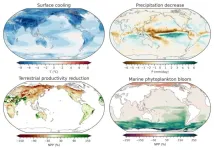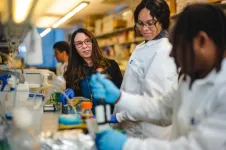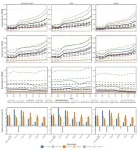(Press-News.org) Reducing sulphur in the air may inadvertently increase natural emissions of methane from wetlands such as peatlands and swamps, a new study has found.
The findings published today in the journal Science Advances suggests that the decline of global sulphur emissions as the result of clean air policies, coupled with the warming and fertilization effects of carbon dioxide emissions lifts a lid on wetland methane production resulting in increased emissions.
The resulting additional future release of 20-34 million tonnes of methane each year from natural wetlands would mean targets to reduce human-caused emissions need to be more stringent than currently set out in the Global Methane Pledge.
Methane, which is one of the most potent greenhouse gases in trapping heat in the atmosphere, is produced in wetlands around the world. Sulphur (in the form of sulphate) has a very specific effect in natural wetlands that reduces methane emissions, while CO2 increases methane production by increasing growth in plants that make the food for methane-producing microbes.
Professor Vincent Gauci from the University of Birmingham and a senior author of the study said:
“Well-meaning policies aimed at reducing atmospheric sulphur appear to be having the unintended consequence of lifting this sulphur ‘lid’ on wetland methane production. This coupled with increased CO2 means we have a double whammy effect that pushes emissions much higher.
“How has this happened? Put simply, sulphur provides the conditions for one set of bacteria to outmuscle another set of microbes that produce methane when they compete over the limited food available in wetlands. Under the conditions of acid rain sulphur pollution during the past century, this was enough to reduce wetland methane emissions by up to 8%.
“Now that clean air policies have been introduced, the unfortunate consequence of reducing sulphur deposition, which does have important and welcome effects for the world’s ecosystems, is that we will need to work much harder than we thought to stay within the safe climate limits set out in the Paris agreement.”
More than 150 nations signed up to the Global Methane Pledge at COP26 in Glasgow, which seeks to reduce human-caused emissions of methane by 30% on a 2020 baseline, by 2030.
The study is the latest to implicate reductions in atmospheric sulphur in driving warming at a faster rate than anticipated. In 2020 shipping pollution controls were introduced to reduce emissions of sulphur dioxide and fine particles that are harmful to human health. This reduction in atmospheric sulphur over the oceans has been implicated in larger warming that expected in what has come to be known as ‘termination shock’.
Lead author of the paper Lu Shen of Peking University said:
“Our study points to the complexity of the climate system. Representation of these complex biogeochemical interactions has not previously been well integrated into estimates of future methane emissions. We show that it is essential to consider these feedbacks to get a true understanding of the likely future of this important greenhouse gas.”
END
Clean air policies having unintended impact driving up wetland methane emissions by up to 34 million tonnes
Impact of cleaner air means that human-emitted methane needs to fall more sharply to hit globally agreed targets
2025-02-05
ELSE PRESS RELEASES FROM THIS DATE:
Scientists simulate asteroid collision effects on climate and plants
2025-02-05
A new climate modeling study published in the journal Science Advances by researchers from the IBS Center for Climate Physics (ICCP) at Pusan National University in South Korea presents a new scenario of how climate and life on our planet would change in response to a potential future strike of a medium-sized (~500 m) asteroid.
The solar system is full of objects with near-Earth orbits. Most of them do not pose any threat to Earth, but some of them have been identified as objects of interest with non-negligible collision probabilities. Among them is the asteroid Bennu with a diameter of about 500 m, which, according to recent studies ...
The Wistar Institute scientists discover new weapon to fight treatment-resistant melanoma
2025-02-05
PHILADELPHIA — (February 5, 2025) —The lab of The Wistar Institute’s Jessie Villanueva, Ph.D., has identified a new strategy for attacking treatment-resistant melanoma: inhibiting the gene S6K2. The team published their findings in the paper, “Selective abrogation of S6K2 identifies lipid homeostasis as a survival vulnerability in MAPKi-resistant NRASMUT melanoma,” from the journal Science Translational Medicine.
“This work shows that, even in the face of notoriously ...
Fool yourself: People unknowingly cheat on tasks to feel smarter, healthier
2025-02-05
UNIVERSITY PARK, Pa. — Fool me once, shame on you. Fool myself, and I may end up feeling smarter, according to a new study led by Sara Dommer, assistant professor of marketing at Penn State.
Dommer wondered why people cheat on tasks like completing crossword puzzles or Wordle and counting calories when the rewards are purely intrinsic, like feeling smarter or healthier. She found that when cheating offers the opportunity to improve self-perception, individuals engage in diagnostic self-deception — that is, they cheat yet deceive themselves by attributing their heightened performance to their innate ability instead ...
Rapid increase in early-onset type 2 diabetes in China highlights urgent public health challenges
2025-02-05
A new study led by researchers from Peking University, published in Health Data Science, reveals a sharp rise in the burden of early-onset type 2 diabetes (T2D) among adolescents and young adults in China from 1990 to 2021. Despite improvements in mortality rates, the incidence and disability-adjusted life years (DALYs) associated with the disease have grown alarmingly.
Using data from the Global Burden of Disease (GBD) Study 2021, the study shows that the age-standardized incidence rate nearly doubled, increasing from 140.20 per 100,000 in 1990 to 315.97 per 100,000 in 2021, with an average annual percentage change ...
Researchers discover the brain cells that tell you to stop eating
2025-02-05
NEW YORK, NY (Feb. 5, 2025)--Columbia scientists have found specialized neurons in the brains of mice that order the animals to stop eating.
Though many feeding circuits in the brain are known to play a role in monitoring food intake, the neurons in those circuits do not make the final decision to cease eating a meal.
The neurons identified by the Columbia scientists, a new element of these circuits, are located in the brainstem, the oldest part of the vertebrate brain. Their discovery could lead ...
Salt substitution and recurrent stroke and death
2025-02-05
About The Study: The results of this cluster trial demonstrate that salt substitution was safe, along with reduced risks of stroke recurrence and death, which underscores large health gains from scaling up this low-cost intervention among patients with stroke.
Corresponding Authors: To contact the corresponding authors, email Lijing L. Yan, MPH, PhD, (lijing.yan@duke.edu) and Maoyi Tian, PhD, (maoyi.tian@hrbmu.edu.cn)
To access the embargoed study: Visit our For The Media website at this link https://media.jamanetwork.com/
(doi:10.1001/jamacardio.2024.5417)
Editor’s Note: Please see the article for additional information, ...
Firearm type and number of people killed in publicly targeted fatal mass shooting events
2025-02-05
About The Study: This study found that most publicly targeted fatal mass shootings involved multiple types of firearms and handguns were the most common type of firearm present. Assault weapons being present during a publicly targeted mass shooting was associated with a slight increase in the number of injuries and deaths occurring during that incident.
Corresponding Author: To contact the corresponding author, Leslie M. Barnard, MPH, DrPH, email leslie.barnard@ucdenver.edu.
To access the embargoed study: Visit our For The Media website at this link https://media.jamanetwork.com/
(doi:10.1001/jamanetworkopen.2024.58085)
Editor’s ...
Recent drug overdose mortality decline compared with pre–COVID-19 trend
2025-02-05
About The Study: Drug overdose deaths have increased exponentially since 1979. This rate of increase accelerated during the COVID-19 pandemic but has since waned. When comparing recent drug-related mortality rates with their pre-2020 trajectory, the vast majority of states remained higher than expected. In the 4 years between 2020 and 2023, nearly all states had higher drug-related mortality rates than their 2019 rates.
Corresponding Author: To contact the corresponding author, Keith Humphreys, ...
University of Cincinnati experts present research at International Stroke Conference 2025
2025-02-05
University of Cincinnati experts will present research at the International Stroke Conference 2025 in Los Angeles.
Study finds small number of patients eligible for new ICH treatment
Intracerebral hemorrhage (ICH), when there is bleeding into brain tissue from the rupture of a damaged blood vessel, is one of the most devastating types of stroke. Patients often suffer from severe neurologic disability or even death. There were no proven treatments for patients with ICH until recently.
“We now have one ...
Physicists measure a key aspect of superconductivity in “magic-angle” graphene
2025-02-05
Superconducting materials are similar to the carpool lane in a congested interstate. Like commuters who ride together, electrons that pair up can bypass the regular traffic, moving through the material with zero friction.
But just as with carpools, how easily electron pairs can flow depends on a number of conditions, including the density of pairs that are moving through the material. This “superfluid stiffness,” or the ease with which a current of electron pairs can flow, is a key measure of a material’s superconductivity.
Physicists at MIT and Harvard University have now directly measured superfluid stiffness for the first time ...
LAST 30 PRESS RELEASES:
Hope for global banana farming in genetic discovery
Mirror image pheromones help beetles swipe right
Prenatal lead exposure related to worse cognitive function in adults
Research alert: Understanding substance use across the full spectrum of sexual identity
Pekingese, Shih Tzu and Staffordshire Bull Terrier among twelve dog breeds at risk of serious breathing condition
Selected dog breeds with most breathing trouble identified in new study
Interplay of class and gender may influence social judgments differently between cultures
Pollen counts can be predicted by machine learning models using meteorological data with more than 80% accuracy even a week ahead, for both grass and birch tree pollen, which could be key in effective
Rewriting our understanding of early hominin dispersal to Eurasia
Rising simultaneous wildfire risk compromises international firefighting efforts
Honey bee "dance floors" can be accurately located with a new method, mapping where in the hive forager bees perform waggle dances to signal the location of pollen and nectar for their nestmates
Exercise and nutritional drinks can reduce the need for care in dementia
Michelson Medical Research Foundation awards $750,000 to rising immunology leaders
SfN announces Early Career Policy Ambassadors Class of 2026
Spiritual practices strongly associated with reduced risk for hazardous alcohol and drug use
Novel vaccine protects against C. diff disease and recurrence
An “electrical” circadian clock balances growth between shoots and roots
Largest study of rare skin cancer in Mexican patients shows its more complex than previously thought
Colonists dredged away Sydney’s natural oyster reefs. Now science knows how best to restore them.
Joint and independent associations of gestational diabetes and depression with childhood obesity
Spirituality and harmful or hazardous alcohol and other drug use
New plastic material could solve energy storage challenge, researchers report
Mapping protein production in brain cells yields new insights for brain disease
Exposing a hidden anchor for HIV replication
Can Europe be climate-neutral by 2050? New monitor tracks the pace of the energy transition
Major heart attack study reveals ‘survival paradox’: Frail men at higher risk of death than women despite better treatment
Medicare patients get different stroke care depending on plan, analysis reveals
Polyploidy-induced senescence may drive aging, tissue repair, and cancer risk
Study shows that treating patients with lifestyle medicine may help reduce clinician burnout
Experimental and numerical framework for acoustic streaming prediction in mid-air phased arrays
[Press-News.org] Clean air policies having unintended impact driving up wetland methane emissions by up to 34 million tonnesImpact of cleaner air means that human-emitted methane needs to fall more sharply to hit globally agreed targets


